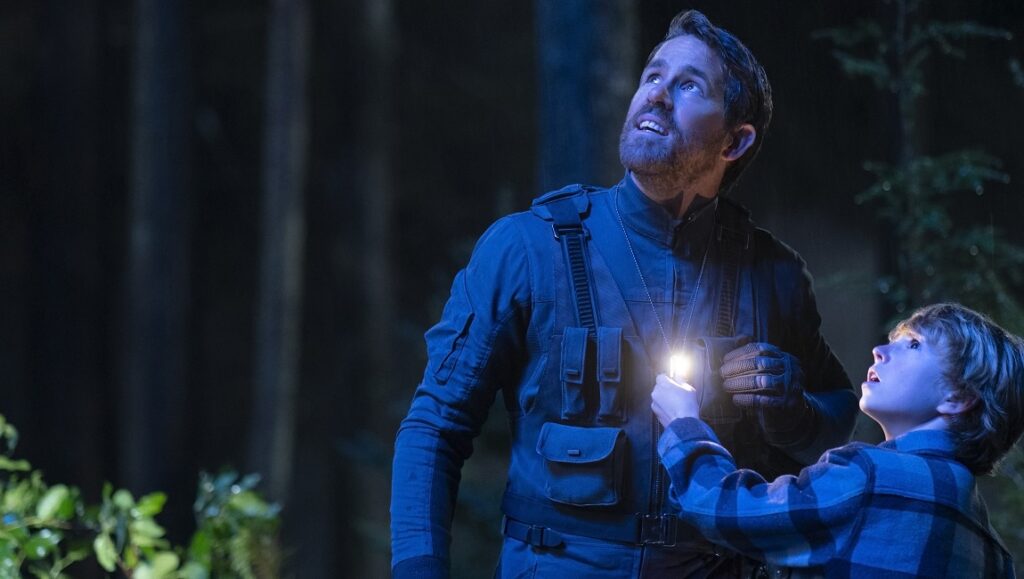The Adam Project takes the shape of any number of sci-fi adventure romps, but offers a surprisingly developed emotional core.
It’s been quite a while since the coming-of-age sci-fi flicks of the ’80s have been on indefinite snooze. The triumph of films where nerdy science kids kept themselves busy with various homemade gadgetry and basement experiments and fantastical missions was a long-ago thing, even as the over-the-top pop subgenre was occasionally, temporarily resurrected in films like J.J. Abrams’ Super 8 or Jeff Nichols’ Midnight Special. But now, after Netflix reformed the cultural landscape with Stranger Things, it seems that those ’80s geeks have emerged from hibernation, and will remain part of the zeitgeist for a good while. It’s within that context that Shawn Levy’s latest effort, The Adam Project, finds footing, mindfully following this very specific genre tradition.
Once again teaming up with Levy after last year’s Free Guy (and also collaborating on the next Deadpool entry) is Ryan Reynolds, here playing a renegade pilot from 2050 who crash lands in 2022 in order to (unwillingly) meet face-to-face with his 12-year-old self (played by promising newcomer Walker Scobell), so that he can — you guessed it — save the future. Given this deeply familiar premise, it won’t be hard for viewers to gradually (or even immediately) foresee how the events of The Adam Project are going to play out, but neither its primary narrative nor any of the subsequent decisions and actions seem to be of any essential concern for Levy and his team of writers. Instead busying itself with merely rehashing its familiar parts, the film is elevated by drilling down into its various human concerns, detailing the dilemmas that both grown and young Adam experience during this time-travel trip.
Indeed, the film’s real power comes in scratching beneath its glossy surface, with its amiable, family-friendly romp giving way to conceptually and emotionally complex matters and conditions, surprisingly in terms of mankind’s psychological and philosophical states rather trading only in sci-fi gobbledygook. Embracing a nonlinear understanding of time, The Adam Project concerns itself with such issues as how one’s past and future selves might judge each other with fuller understanding than conventionally afforded, or the role memory plays in our actualization through self-acceptance and forgiveness — this in addition to moving depictions of rekindling with long-passed loved ones. This contemplative, melancholy strain is telegraphed from the beginning, when child Adam finds his older version wounded and sheltered in his father’s garage, and it’s easy to see that the film is foremost about reconciling our inner scars, not merely stitching up bullet holes; it’s an adventure film in which the action is of a decidedly emotional nature.
It’s also evident from the outset that The Adam Project is an assemblage of various parts and devices from well-known films. It’s a fact that Levy never tries to conceal, offering plenty of direct allusions and deliberately evoking the specific vibe of VHS-era cinema, a nostalgic flirtation that never feels lazy. Indeed, the approach even manages a certain delicacy within a narrative that offers the twinned themes of embracing the past and the future. And as far as playful references go, it’s likely no accident that Jennifer Garner and Mark Ruffalo show up here as Adam’s parents, the duo once again bending time (though in a different way) after their collaboration in 13 Going on 30. Smartly, all of this is executed with a fast pace that should make it near impossible for viewers to feel burdened or bored throughout, and it does so without uselessly skewing overly complicated with scientific bells and whistles or excessively fixating on the existential crisis of its narrative or some seemingly invincible villain. Instead, Levy energizes the film with a sense of joy and easygoing humor to create a mood — one that never feels maudlin — indebted both to retro and futuristic flourishes, utilizing some light aesthetic styling that plays out as an appropriate mix of cutting-edge tech and arcade texture.
But ultimately, if there’s one quality that situates Shawn Levy’s The Adam Project above similar mainstream projects, it’s the film’s impressive cinematic IQ, casually and wittily executing its vision without getting bogged down in jargony specificity, and understanding that even as its timelines bend or its fighting sequences wrap, what’s essential to its character is a commitment to exploring one’s inner struggles, to the idea that humanity, in all its messy emotions and complications, is an unchanging reality of the future. Much like young Adam here, The Adam Project may seem underdeveloped to some and easy to dismiss, but its bright mind and big beating heart are easily distinguishable to those who choose to look.
You can currently stream Shawn Levy’s The Adam Project on Netflix.


Comments are closed.